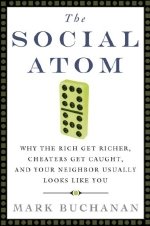Just a few more comments on ethnic diversity and social cohesion. Robert Putnam's new study shows that more diversity tends to be correlated with lower levels of trust in a community, at least in the U.S. This is an important finding, and shows that diversity does come with a cost at least in the short run. Putnam shows that diversity in the long run has lots of benefits, even economic benefits, but in the short term, trust languishes as people learn to adapt and navigate a new social world .
One really interesting point that he also dwells on is the difficulty of defining diversity, because of the inherent malleability of group boundaries. How we divide people today into different ethnic groups isn't how we'll group them tomorrow; we're constantly changing which markers (skin color, style of dress, religion) seem more or less important. As a nice example, he cites his personal experience of the waning importance of religious boundaries:
I grew up in a small town in the Midwest in the 1950s. Of the 150 students in my senior class, I knew the religion of virtually every one. Even now, when I have long forgotten their names, I can generally remember who was a Catholic, who was a Methodist and so on. Nor was that some personal quirk of mine, because in fact most of my classmates knew everyone else’s religion. My own children, who went to high school in the 1980s, knew the religion of hardly any of their classmates. ... over those thirty years religious endogamy (the practice of marrying only within one’s faith) has largely faded in America, at least among mainline Protestants and Catholics and Jews. In the 1950s, for the most important aspect of any adolescent’s life – mating – it was essential to keep track of one’s peers’ religious affiliations. By the 1980s, religion was hardly more important than left- or right-handedness to romance.
Even skin color, which seems to be so deeply ingrained in our minds as a salient social marker, isn't actually hard-wired in any sense. I've written earlier about the fascinating experiments of Robert Kurzban, John Tooby, and Leda Cosmides showing that racial awareness can be erased. What we're really good at is detecting group affiliations among people, and using such affiliations as tools to navigate the social world. We'll latch onto any marker that works as a short-hand for identifying the important groups. Race as measured by skin color is one of the most obvious potential markers. But these experiments showed that if skin color doesn't correlate with group boundaries, people very quickly learn to ignore it and look to other markers that do -- whether it's style of dress, manner of speaking, or what have you.
So I suspect that the social cost of diversity may in some sense be a psychic cost paid during the process of relearning markers that divide people into groups in a socially useful way. When diversity increases, there's social chaos and shifting boundaries; evolving group affiliations don't necessary follow the lines of the old markers, and so it is more difficult with ethnic markers alone to know who to trust. Hence, trust drops off even between those who share the old ethnic markers.
That's pure speculation on my part. I hope Putnam's or someone else's future work sheds more light. Kate has also offered a number of interesting comments on my last post, well worth a read. The ultimate question is how to manage immigration sensibly. It looks as if we just don't know enough yet to be sure, but Putnam's work clearly suggests, I think, that managing the rate of immigration is probably a good idea. Too much change too rapidly creates trouble.




2 comments:
The question is whether the costs(that have been established by scientists) outweigh the benefits(promoted by the media and business). BTW I recommend Dr Frank Salter's "On Genetic Interests" for a more serious investigation into ethnic markers, our need for them and their inherent worth. He takes Dawkins self-gene to its logical conclusion. Really brilliant stuff.
Thank you for the nod! It gave me a thrill to see my name in print.
The Kurzban, Tooby, and Cosmides finding is encouraging because the future is going to bring increasingly heterogeneous communities, whether the consequences are positive or negative.
Less encouraging is the assertion that humans are hard-wired to seek reliable signals of affiliative coalitions. That suggests that patterns of in-group resource-sharing will not change, that only that the nature of the in-group will morph. That strikes me as an argument for a government that values equality and that can maintain a level playing field.
With regard to lowered social capital within heterogeneous groups, I thought of a mechanism that might be involved. Roy Baumeister's research has found that people who believe they are going to be socially isolated in the future (or who are told that their co-workers don't want to work with them) experience a loss of self-regulation, impaired logical reasoning, increased aggressiveness, an avoidance of self-awareness, and increased passivity. That sounds a lot like Putnam's "hunkering down" to me.
This is speculation, of course, but I wonder if the phenomena of decreased "social capital" in heterogeneous communities is related to the individual level mechanism of anticipated social isolation. That is, the emergence of out-groups within a homogeneous community may unconsciously threaten individuals with future social isolation, and they hunker down, accordingly.
Post a Comment